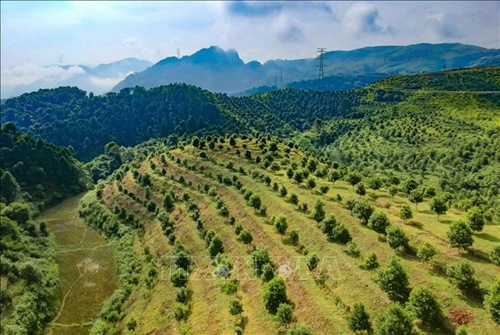With its favorable land and climate conditions, the province was designated by the Ministry of Agriculture and Rural Development as a key area for macadamia development in the Northwestern and Central Highlands through 2020, with further potential identified through 2030.
    |
 |
|
Macadamia farm in Quai Nua commune, Tuan Giao district, Northern province of Dien Bien |
Dien Bien now is one of the largest macadamia-growing regions in the Northwest, covering nearly 7,200 ha.
Farmer La Van Chanh from Quai Nua commune, Tuan Giao district said that as one of the pioneers in macadamia cultivation, he was worried about the growth and economic viability of macadamia trees.
However, after six years, as his 260 trees began to blossom and bear fruit, the family's efforts were rewarded as he sold out all of fresh macadamia nuts at an average price of 100,000 VND (3.9 USD) per kg.
He said that macadamia cultivation was far more profitable than traditional crops like corn and cassava. From the 6th year, his family has earned a steady income from macadamia farming.
Quai Nua was among the first communes in Tuan Giao to adopt macadamia cultivation, starting with over 500 ha of experimental plantations in 2013. Over a decade, macadamia has proven its growth potential and delivered substantial economic benefits to local residents. With stable prices ranging from 35,000 to 45,000 VND per kg for fresh fruits, many families have reported incomes between 80 to 100 million VND per season, significantly contributing to sustainable poverty reduction in the area.
Recognizing the crop's potential, Tuan Giao district expanded its cultivation area in 2022 and implemented special support policies under the national target program for ethnic minorities. Local authorities provide over 200 saplings and corresponding fertilizers for each ha of cultivated land, with assistance lasting for five years.
Lo Van Tuan, Vice Chairman of the commune People’s Committee, noted that these support policies have spurred investment from local residents, particularly among ethnic minorities, in high-value crops like macadamia. The local government is committed to transitioning less productive land into macadamia farms, ensuring the crop continues to flourish and alleviate poverty.
At the end of 2024, the commune had 1,000 ha of macadamia, achieving 129% of the planned target. In 2025, several villages plan to cultivate nearly 100 additional ha with over 26,000 new trees. This success underscores the determination of both the administration and people to make macadamia a staple crop in the region.
In addition to expanding cultivation, processing and marketing macadamia products have become crucial for local economic development. Processed goods like dried macadamia nuts, shelled nuts, and macadamia oil have increased the agricultural value and expanded both domestic and international markets. Many families in Tuan Giao have invested in modern machinery, such as dryers and shellers, to enhance their processing capabilities.
Doan Thi Thoa, owner of a macadamia processing facility in Tuan Giao, said that she buys 80-100 tons of fresh fruits each season from local growers. After being processed, dried macadamia nuts sell for between 500,000 and 1 million VND per kg.
The processing sector not only helps local people to increase incomes but also creates stable jobs for many local workers. Dien Bien province aims to have 90,000 ha of macadamia by 2030, positioning it as a key agricultural product to combat poverty and enhance the living standards of ethnic minorities. The province is committed to applying scientific advancements in the cultivation, care, and processing of macadamia to improve yield and product quality.
Director of the province’s Department of Agriculture and Rural Development Lo Van Cuong said that macadamia is well-suited to the province's climate and soil. Localities such as Tuan Giao and Muong Ang have scaled up macadamia production and formed partnerships with companies like TH Group to enhance cultivation. Currently, macadamia products from Dien Bien are sold both locally and in other provinces, changing local production mindsets and motivating residents, especially ethnic minorities, to invest in their homeland.
The department is aligning macadamia cultivation with land use and afforestation plans, utilizing barren and less productive land areas for this multi-purpose crop. Macadamia not only enhances the landscape but also generates income and environmental benefits, including carbon credit opportunities, he said.
Source: VNA